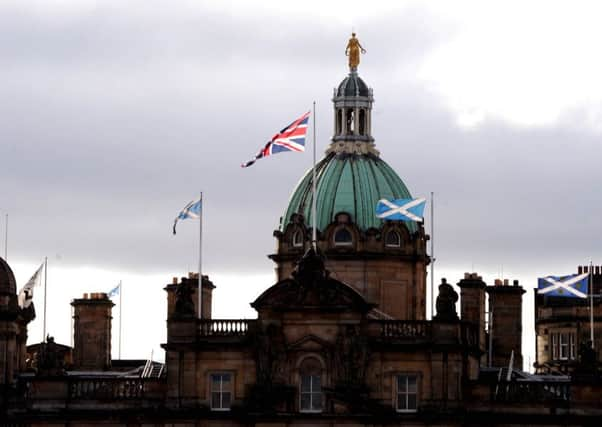Bill Jamieson: Stuck with the legacy of the banks debacle


At long last, you may well feel. Back in late 2009, when it seemed the entire UK banking system was about to collapse, the government rescued Lloyds after its fateful shotgun wedding with HBOS, taking a 43 per cent stake costing more than £20 billion. It has so far recovered more than £18 billion, helped also by special dividends to the Treasury. And it looks on track to recover all of the money.
Is this, then, the final chapter of the most ignominious period in banking history? Sadly, no. Further litigation and penalties still lie ahead, both for Lloyds and for RBS. Doubts surround the reliability of regulatory stress tests. Most worrying of all is that painful lending lessons may already have been forgotten.
Advertisement
Hide AdAdvertisement
Hide AdLegacy issues abound. Many corporate customers were mauled as the Bank of Scotland sought to curb its loan book excesses. And Lloyds is fighting a £350 million court compensation claim by some 6,000 shareholders over the bank’s takeover of HBOS.
The state of HBOS’s finances was found to be even worse than was revealed in the offer document, requiring a further injection of £5.7bn of taxpayer funding in 2009. Shareholders say their investments were hit to the tune of around £1 per share, which they want to claim back.
Meanwhile, over at RBS, which once boasted the biggest banking balance sheet in the world, losses continue to be reported, recovery of state support has not even begun and restoration to health still looks far distant.
Year after year since the rescue, the bank has been beset by colossal write-offs, fines and penalties, falling with almost monotonous regularity. Just when chief executive Ross McEwan looked to be within sight of a recovery, along came another hammer blow from the past, miring the group in further losses.
On top of penalties for Payment Protection Insurance mis-selling running into billions of pounds, the bank has had to pay out £6.4bn in misconduct charges and its traders cited in the Libor rigging scandals. The retail arm was also fined £56m for an IT meltdown.
And the bloodletting continues. The bank, still 73 per cent owned by taxpayers after the £45bn rescue in October 2008, has since failed to report a single full-year profit. In the first nine months of 2016, it lost £2.5bn – capped by a £469m deficit in the third quarter alone.
Now an even greater penalty looms. It centres on the bank’s role in the mis-selling of risky US mortgages – the epicentre of the 2008-09 crisis. The fine from the US Department of Justice (DoJ)could be as much as $10bn (£8.25bn) – and on some accounts even a $10bn figure would be greeted with relief.
Deutsche Bank, which had a much smaller involvement in the US sub-prime market than RBS, sought agreement around a figure of $5bn for its own settlement. But the DoJ countered with a demand for $14bn – equivalent to 85 per cent of the bank’s market value. The final settlement of $7.2bn is an ominous pointer to what might now be in store for RBS.
Advertisement
Hide AdAdvertisement
Hide AdAnd on top of all this is the overhang of a lengthy legal battle by shareholders against RBS who insist they were misled over the £12bn rescue rights issue in the summer of 2008. But the crisis intensified, RBS struggled to secure money market funding and the shares collapsed, destroying the savings of tens of thousands of small investors.
So for small investors, including thousands of shareholder counter staff, and the giant pension funds, many of whom were substantial holders of RBS shares, talk of “a final chapter” and the book now being closed on the banking debacle rings hollow.
Despite the stock market recovery to new all-time highs last week, shares in both Lloyds and RBS are still a pale shadow of what they once were. Shares in Lloyds are standing around 66p compared with 61p in late 2009 and upwards of 250p in 2008 before the crisis erupted. Shares in RBS are hovering around 220p. Allowing for the one-for-ten consolidation in 2012, the adjusted share price of 22.4p is barely higher than it was at the time of the crisis. For investors, recovery talk is empty.
There are the less easily quantifiable but substantial losses by way of opportunity cost – what both banks might have achieved had the banking crisis not struck – and the loss to Scotland of the standing and prestige of two of the UK’s biggest banks. The reputation of Scotland’s capital as a global banking centre suffered an irreparable blow.
And might history be repeating itself? Bank of England chief economist Andy Haldane said this month that the current boom in consumer credit is not a cause for worry: “Aggregate borrowing by households isn’t tearing away right now – we have been through a long period of subdued borrowing, and in the main that is still true for the largest part of borrowing, for house purchases, which is growing at modest rates.”
But Bank of England figures last week showed credit card borrowing reached a record £66.7bn in the year to November, with consumer credit – all credit cards and car loans – rising at its fastest rate in 11 years, up 11 per cent over the last 12 months period to reach £192bn – ominously close to the £208bn peak at the time of the Lehman Brothers crash in September 2008.
We may celebrate the progress at Lloyds after eight long years. But beneath today’s consumer spending binge, painful memories linger. And they need to stand as warnings that will last for generations. After almost nine years, might we be forgetting them already?